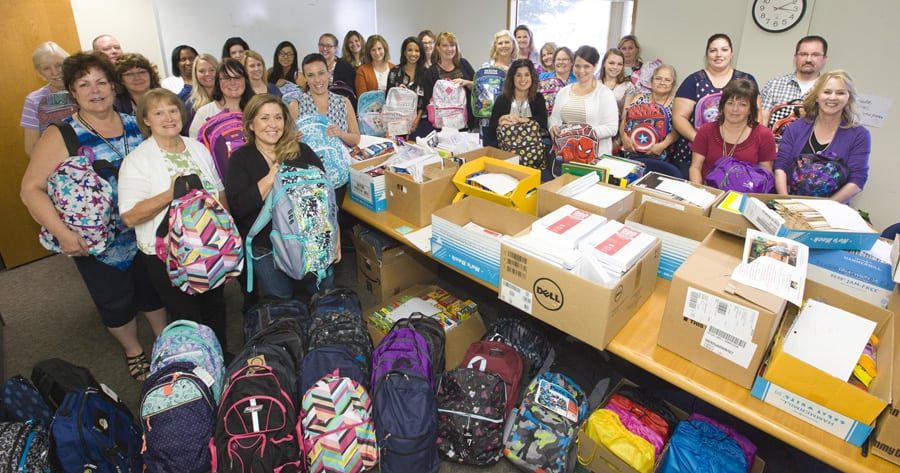
Home » MSA women’s group provides networking, community service opportunities
MSA women’s group provides networking, community service opportunities

September 14, 2017
By Stacey Denny
Anel Suarez credits a group of female colleagues for encouraging her to apply for a new position at Mission Support Alliance.
Suarez said members of MSA’s Synergy Network bolstered her confidence to seek the promotion.
“All of the women in the group were very supportive and encouraging. I’m not sure I would have applied if I didn’t have that,” she said.
Since forming in 2016, the Synergy Network has worked to promote MSA female professional development, create a conduit for advocacy, engage MSA women in community outreach, create internal employee engagement, develop networking opportunities and work with other Hanford site women’s groups.
There are currently 112 members in the Synergy group, the first women’s group at MSA. To join, members must be a female MSA employee and fill out a membership form. There are no other requirements or fees.
Though it’s a women’s networking group, all employees, male or female, may attend group activities.
The Synergy group’s planning committee meets every other week. There are informal social events every other month and quarterly professional development opportunities.
Suarez said there are often men in leadership roles attending the activities who are very supportive of the Synergy group.
Julie Lindstrom, MSA’s manager of staffing, diversity and development, said the idea for the Synergy Network came about after discussions with her staff about the specific challenges women have in the workplace and at home.
Lindstrom co-chairs the group with Ann Shattuck, director of environmental integration services.
“At the end of the day, we just wanted to create a place for incredible women to gather, grow and become the best versions of them possible with the help and support of other like-minded women. We researched options and developed a plan. That plan was approved by management and the Synergy group was launched,” she said.
The group offers informal networking, formal panel discussions and community volunteer opportunities.
Lindstrom said the group hopes to formalize many of these events and strengthen the diversity of community panelists in the coming year. She said she is hoping to invite women from other communities to speak to the group. “We are just getting started, and already learning that together we can accomplish anything,” Lindstrom said.
Shattuck said the importance of the group becomes very clear when considering that about 25 percent of MSA’s roughly 2,000 employees are women.
The sheer size of the Hanford site means the company has women working in every facility, but “you could work here your entire career and never meet every woman co-worker,” she said.
Shattuck said she enjoys participating in the group’s community service work.
The group has participated three times in Tri-County Partners Habitat for Humanity’s women’s building projects.
“We do volunteer projects in the community together, and I have made some really great business and personal connections that I wouldn’t have made if not for the Synergy Network,” she said.
The Synergy group participated in the Stack the Packs, a program that provides backpacks and school supplies to foster kids.
Members sponsored a clothing drive for Skyline Adventures, a nonprofit that takes underprivileged youth on ski trips. They also support the Women Helping Women Fund Tri-Cities, a nonprofit dedicated to empowering women and children.
Most recently, they participated in a mock interview process for women in the community seeking employment.
During an informal network gathering, Shattuck connected with a young woman who was interning in another department and found her background and interest was in the environmental field. Shattuck said she helped her find a position after her internship.
“It’s these opportunities to mentor and be mentored that are also really exciting,” Shattuck said.
In July, the group held a “Planting the Seeds for STEM” event with female panelists from MSA.
The discussion was popular with the participants because middle and high school children of employees were invited to attend and learn about career opportunities in Science, Technology, Engineering and Mathematics, or STEM, fields, said Suarez, MSA’s deputy vice president of information management.
She also was one of the panelists who spoke about the importance of STEM careers for women. She said though more women are entering STEM fields, she was often the only woman in many of her college classes.
“This is why outreach and mentoring are very important to me. It’s these types of discussions that have broadened the field to allow for more diversity,” she said.
Suarez said she was proud to have a group like the Synergy Network at MSA.
“The Synergy Network’s board is really active and engaged, and the members are amazing. Having the availability of other successful women to connect with is so valuable,” she said.
Lindstrom agreed: “The support you get within this network is unparalleled, as I can attest to personally. In the past year and a half, I have developed friendships and gained mentors that I will cherish throughout my career at Hanford and beyond.”
Local News Education & Training
KEYWORDS september 2017





